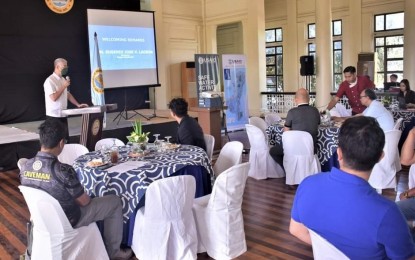
WORKSHOP. Negros Occidental Governor Eugenio Jose Lacson gives a message before representatives of local government units (LGUs) and other stakeholders during the Cascading Workshop on Technical Working Group Formation and the 2023-2030 Provincial Integrated Water Security Plan (PIWSP) in Bacolod City on Feb. 27, 2024. He said in a statement on Thursday (Feb. 29, 2024) that they would endeavor to operationalize the PIWSP through the establishment of technical working groups in each LGU. (Photo courtesy of PIO Negros Occidental)
BACOLOD CITY – Local government units (LGUs) in Negros Occidental will form technical working groups (TWGs) for the implementation of the Provincial Integrated Water Security Plan (PIWSP) for 2023 to 2030.
“We will endeavor to operationalize our PIWSP through the establishment of technical working groups in each LGU,” Governor Eugenio Jose Lacson said in a statement on Thursday.
On Tuesday, LGU representatives and other stakeholders were equipped for the localizing of water security TWG during a cascading workshop conducted by the provincial government at the Capitol Social Hall in this city.
In 2022, Lacson issued an executive order creating the Provincial Integrated Water Security Council (PIWSC) and the province received assistance from the United States Agency for International Development (USAID) Safe Water project in formulating the PIWSP.
Lacson, who chairs the PISWC, pointed out that the initiatives and activities on water security are proof of the provincial government’s determination and resolute commitment to promoting water security with a systematic, scientific, and sustainable approach.
“It is anchored on the USAID Safe Water’s Integrated and Inclusive Water Security Framework and the 6th Sustainable Development Goal of the United Nations Development Program,” he said.
Provincial Administrator Rayfrando Diaz II said the provincial government aims to integrate the approach to water security, which would enable the development and implementation of holistic solutions.
“This would address multiple water-related challenges simultaneously, such as water scarcity, pollution, habitat degradation, and public health risks, resulting in comprehensive and long-lasting improvements in water security,” he added.
Based on the province's data, Negros Occidental’s groundwater availability is only at 8 percent, which indicates an urgent need to use other water sources, including surface water resources, which have 92 percent availability.
Current underground water resources will no longer hold the demand of the province by 2035, it added.
As part of the initiatives for water security, the province, in collaboration with the Public-Private Partnership Center and USAID Safe Water, has proposed the implementation of the PHP1.2-billion Negros Occidental Bulk Water Supply Project.
The Imbang and Malogo Rivers are considered as the surface water resources for the project.
The pre-bid conference held earlier this month was joined by 11 firms that bought bid documents while the project bidding is set in June. (PNA)
